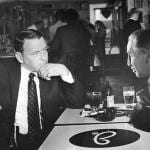Wayne Grudem is not one:
I am guessing a lot of my readers have never heard of Wayne Grudem. He is an evangelical theologian and the author of a very popular one-volume treatment of evangelical systematic theology. He is also well-known within evangelical circles for defending a “complementarian” view of gender roles in the church and society.
Grudem is the quintessential evangelical insider. He speaks and writes for evangelical churches and rarely ventures out of this subculture to engage a broader American public. This is why most people outside of evangelicalism have never heard of him.
When I was a student at Trinity Evangelical Divinity School (1989-1992) I took a theology course with Grudem. I don’t remember much about it other than the fact that Grudem spent a lot of time talking about his work on the Biblical idea of prophecy. (I also remember having to read all of Calvin’s Institutes!). He would eventually argue that today’s Christians needed to reclaim the gift of prophecy. If I remember correctly, he argued that the Holy Spirit could bring divine revelation to a believer’s mind.
Neither is D. Michael Lindsay though he knew who evangelical elites were:
There has been little to suggest that these rumblings of dissent represent any kind of threat to Trump’s political support. Many of these Trump critics might be best understood as part of a more urban, internationalist, and broad-minded élite class within the evangelical movement. In his 2007 book, “Faith in the Halls of Power,” D. Michael Lindsay, a former sociologist at Rice University and currently the president of Gordon College, distinguished between “cosmopolitan” and “populist” evangelicalism. The populist wing of the movement “depends on mass mobilization and large-scale democratic action” and “relies upon a rhetoric of dichotomies (as in ‘good’ and ‘evil’) and appeals to the commonsense concerns of average people,” Lindsay writes. He points to prominent figures such as James Dobson, the founder of Focus on the Family, and the pastor and televangelist Joel Osteen as representatives of populist evangelicalism. He describes cosmopolitan evangelicals as having “greater access to powerful institutions” and writes that “the social networks they inhabit are populated by leaders from government, business, and entertainment.” The problem for Trump opponents is that, when it comes to electoral sway and cultural influence within evangelicalism, the populists exercise far greater leverage.
Lindsay’s focus is on documenting the emergence of the élite class of evangelicals. He devotes less attention to the root causes of differing cultural and political attitudes between cosmopolitan and populist evangelicals—though those causes may hold the key to understanding evangelicalism’s turn toward Trumpism.
A couple of observations: one, theology is not much of a factor in becoming an elite within evangelicalism. Not even being a charismatic helps. Two, what matters to being elite is not using dichotomies between good and evil. That’s what populists do. Elites know that the world is, to use the much overused word, complicated.
This is what makes the Trump phenomenon fascinating. Elite journalists and editors, not to mention lots of people with Ph.D.’s, use black-and-white categories to assess the president. For instance:
where was Grudem when Trump separated families from children at the border, said that there were “fine people on both sides” at Charlottesville, lied or misrepresented the truth over 15,000 times, tried to take healthcare away from millions of Americans, pulled out of the Paris Climate Agreement, prevented Muslims from entering the country, left Syrian Christians for dead, hired nativist and racist Stephen Miller, refused to release his tax returns, eliminated an ethics court for incoming White House staff, stood by as children bullied their classmates in the name of Trump, said Mika Brzezinski was “bleeding badly from a face-lift,” backed racist Alabama Senate candidate Roy Moore, defended Confederate monuments, and tried to end the DACA program?
The real test of elitism may be what passes as acceptable by the elite newspapers and magazines. If editors at the New Yorker and Washington Post decide to understand politics by moral calculations, then those evangelicals whose morality matches those gatekeepers gain elite status.















